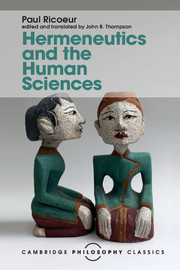Book contents
- Frontmatter
- Contents
- Preface to this edition
- Acknowledgements
- Editor's introduction
- Notes on editing and translating
- A response by Paul Ricoeur
- Part I Studies in the history of hermeneutics
- Part II Studies in the theory of interpretation
- Part III Studies in the philosophy of social science
- Select bibliography
- Index
Editor's introduction
Published online by Cambridge University Press: 05 July 2016
- Frontmatter
- Contents
- Preface to this edition
- Acknowledgements
- Editor's introduction
- Notes on editing and translating
- A response by Paul Ricoeur
- Part I Studies in the history of hermeneutics
- Part II Studies in the theory of interpretation
- Part III Studies in the philosophy of social science
- Select bibliography
- Index
Summary
The nature of language and meaning, of action, interpretation and subjectivity, are issues of increasing concern to a wide range of contemporary disciplines. For philosophers, linguists, literary critics and social scientists, the clarification of such issues has become an urgent and inescapable task. In the English-speaking world, however, the pursuit of this task remains hindered by both an institutionalised respect for disciplinary boundaries and a long-standing insularity with regard to Continental traditions of thought. There can be no doubt that the growing familiarity with the work of Paul Ricoeur will help enormously to overcome these obstacles. As one of the leading philosophers in postwar France, Ricoeur has written with originality and authority on an astonishing variety of topics. During the last few years, he has turned his attention more directly to problems of language, entering into a sustained dialogue with the tradition of hermeneutics. The dialogue with this tradition, whose members have focused for centuries on the process of interpretation, forms the backcloth for the contributions contained in this volume.
In order to appreciate fully the significance of Ricoeur's current work, it is necessary to have some perspective on his writings as a whole. My aim in this introduction is to provide such an overall view. I shall begin with a brief synopsis of Ricoeur's career. In the second part, I shall trace the evolution of Ricoeur's thought, from his early project for a philosophy of the will, through his encounters with psychoanalysis and structuralism, to his recent preoccupation with the theory of the text. In the third part, I shall sketch the central themes of Ricoeur's current work. Finally, in the fourth part, I shall summarise some of the main arguments of the essays which appear in this volume. It should be said at the outset that no attempt will be made to give a comprehensive survey of Ricoeur's work. Certain contributions will be emphasised at the expense of others and some of his writings, for example those dealing with educational and theological issues, will largely be left aside. It should also be said that, however important Ricoeur's ideas may be, I do not believe that they are without difficulties; but this is not the place to express my reservations, which I have developed in detail elsewhere.
- Type
- Chapter
- Information
- Hermeneutics and the Human SciencesEssays on Language, Action and Interpretation, pp. xi - xxxviiPublisher: Cambridge University PressPrint publication year: 2016

